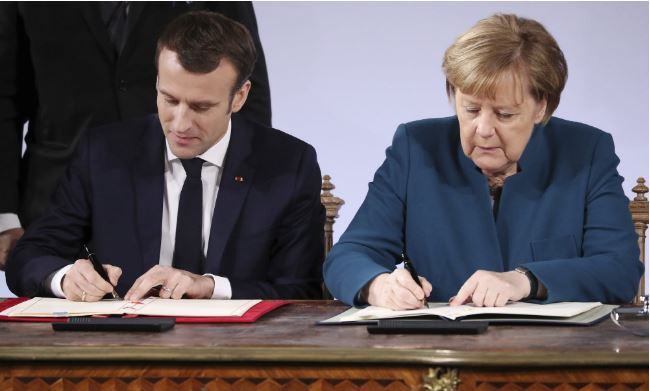France and Germany Tuesday signed a new friendship treaty to deepen their alliance at a time of crisis for the EU, drawing fire from the far right whom President Emmanuel Macron slapped down for “spreading lies” about the pact, AFP reported.
Macron and German Chancellor Angela Merkel inked the accord to deepen ties as Britain prepares to leave the European Union and tensions are rising with populist leaders in the bloc.
The treaty pledges stronger political, economic and defence ties and restates the countries’ commitment to the European Union.
The document has come under attack from the far right, which accuses the pair of signing away their countries’ sovereignty.
The leader of France’s National Rally, Marine Le Pen, accused Macron of “an act that borders on treason”.
And a co-chief of Germany’s far-right AfD party, Alexander Gauland, charged Paris and Berlin were seeking to create a “super EU” within the European Union.
“We as populists insist that one first takes care of one’s own country,” said Gauland. “We don’t want Macron to renovate his country with German money.”
Macron condemned the allegations.
“Those who forget the value of French-German reconciliation are making themself accomplices of the crimes of the past,” he said.
“Those who… spread lies are hurting the same people they are pretending to defend by seeking to repeat our history.”
Macron says the treaty “shows that our friendship between France and Germany, our common project and our ambition for Europe are what really protect us, and what allow us really to take back control of our lives and to build our destiny”.
Tuesday’s signing ceremony took place in the German city of Aachen, on the Dutch and Belgian borders – a place rich in European symbolism as the seat of power of Charlemagne, the 9th-century emperor who ruled over swathes of western Europe.
It was held on the anniversary of a friendship pact signed in 1963 by Charles de Gaulle and Konrad Adenauer.
The new accord aims to strengthen the “Franco-German motor” seen as the driving force behind European integration.
Merkel said it was all the more important as “we live in special times” when “more decisive, clearer and future-oriented answers are needed”.
Even if Europe is today more integrated than decades ago, “populism and nationalism are on the rise”, she noted.
Both European leaders have been facing domestic discontent in recent months.
Macron took office in May 2017 promising major reforms of the EU to restore faith in its institutions and quell rising populism.
But his ideas met with only lukewarm support from Merkel and other EU leaders.
Paris and Berlin have also differed on other issues including how to tax big internet firms.
Macron’s hand has been further weakened by more than two months of “yellow vest” protests in France.
In Aachen, he was greeted by boos and calls of “Macron, resign” from dozens of protesters who had travelled across the border.
Merkel is on her last lap as the leader of Europe’s biggest economy, having announced that she would step down as chancellor in 2021.
Her departure may be hastened if her party garners poor scores at European Parliament elections in May, as well as three crucial state polls in eastern Germany, the stronghold of the AfD party.
“We’re seeing an existential crisis in terms of European integration, with Brexit and the expected strengthening of nationalists at the next European elections,” said Claire Demesmay, a political scientist at German research institute DGAP.
“In this context, confirming this belief in Franco-German cooperation has symbolic value,” she told German public radio.
The treaty commits France and Germany to closer military ties, including possible joint deployments — in the event of a terror attack, for example.
The two countries could also cooperate more closely on procurement, such as the purchase or development of new tanks or fighter jets.
And it includes a “mutual defence clause” in the event of one of them being attacked, although they are already committed to this as members of NATO.
The pact aims to build a Franco-German “common military culture” and “contributes to the creation of a European army,” said Merkel.
Macron sparked a row with US President Donald Trump late last year by urging Europe to reduce its military dependence on the United States, even calling for a “real European army”.
Some other European leaders have also bristled at the idea of an all-dominating “Franco-German motor”.
Italy’s far-right Interior Minister Matteo Salvini has said ahead of the European elections that he wants to challenge Merkel and Macron’s pro-European message with a eurosceptic “Italian-Polish axis”.






Comments are closed for this post.